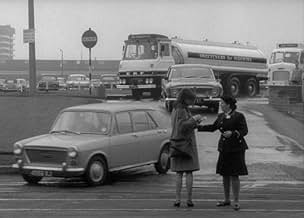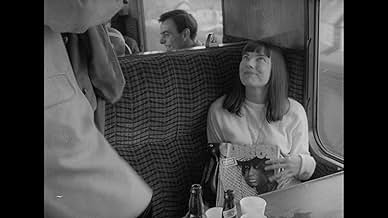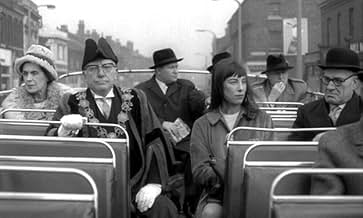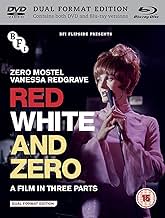VALUTAZIONE IMDb
6,4/10
647
LA TUA VALUTAZIONE
Aggiungi una trama nella tua linguaAn impassive young girl is taken from her suicidal big-city life back to a city in the North of England on a bizarre bus trip. Seen through the poetic eye of the camera, this is a commentary... Leggi tuttoAn impassive young girl is taken from her suicidal big-city life back to a city in the North of England on a bizarre bus trip. Seen through the poetic eye of the camera, this is a commentary of doomed British morbidity.An impassive young girl is taken from her suicidal big-city life back to a city in the North of England on a bizarre bus trip. Seen through the poetic eye of the camera, this is a commentary of doomed British morbidity.
Allan O'Keefe
- Supporter
- (as Alan O'Keefe)
Dennis Alaba Peters
- Mr. Wombe
- (as Alaba Peters)
Recensioni in evidenza
This is a rather confusing situation in that generally it is held that Red White and Zero was a three part film with the involvement of Peter Brook, Lindsay Anderson and Tony Richardson as directors with only Anderson's White Bus segment being completed. Yet here we have a BFI release claiming discovery of the completed portmanteau film yet there are clearly three senate films complete with individual credits. Be all that as may be the Brook segment featuring Zero Mostel is a very 60s slapstick/surreal effort that barely succeeds and the luscious looking short film featuring Vanessa Redgrave (sort of) singing and cavorting about is not terrible but cries out for the participation of Jeanne Moreau, for whom it was originally intended, before Richardson switched ladies. The White Bus remains the most competent and fine looking film displaying the wonders of industrial Manchester in a jokey visitor tour that ironically probably does take place today. As might be expected, as well as the splendid photography we get social comment and politics mixed in with a fondness for the English rural landscape and a humane picture of life of the common man (or woman as rather surprisingly here presented).
This film had a big impact on me. Saw first saw it on BBC2 in the 70's as part of a Anderson Retro. Originally based on Delaney's book Red, White & Zero it was a three director/stories feature film. Although the other two parts were never finished. That's why the film doesn't have titles.
The reason why I loved this film was because I grew up in a slum clearance area of Liverpool. The film's landscape was exactly the same. Everything demolished - except for the pubs. I'd never seen anything like it on TV before.
I recently got another chance to see it and loved it. The story follows a girl who is fed up with working in London. The shot opens with her at a desk while the legs of a hanged fellow worker dangle from the celling. She leaves London - tired and fed up - and goes home to Manchester (although parts of the film were filmed in Birmigham). She stands at a desolate bus stop in the middle of demolished terraces. When along comes the white bus - it's a tour guided ride which shows the best of the city. What makes it even more special is that the bus is on it's maiden voyage. The Lord Mayor (Arthur Lowe) and other dignitaries ride the bus on a tour of factories, libraries and even a civil defence demo. At the end of the tour the girl winds up in a small cafe watching, inside what look like married couple. Thier love and passion for the small things in life mesmerises and charms the girl - reminding her what life's all about.
For Delaney it's like Charlie Bubbles - dealing with leaving your home town and looking at the effect it has on you. For Anderson it's yet another example of his cinematic poetry - like If... and Sporting Life. This film is a very special film by very special people. Oh thank you for making it.
The reason why I loved this film was because I grew up in a slum clearance area of Liverpool. The film's landscape was exactly the same. Everything demolished - except for the pubs. I'd never seen anything like it on TV before.
I recently got another chance to see it and loved it. The story follows a girl who is fed up with working in London. The shot opens with her at a desk while the legs of a hanged fellow worker dangle from the celling. She leaves London - tired and fed up - and goes home to Manchester (although parts of the film were filmed in Birmigham). She stands at a desolate bus stop in the middle of demolished terraces. When along comes the white bus - it's a tour guided ride which shows the best of the city. What makes it even more special is that the bus is on it's maiden voyage. The Lord Mayor (Arthur Lowe) and other dignitaries ride the bus on a tour of factories, libraries and even a civil defence demo. At the end of the tour the girl winds up in a small cafe watching, inside what look like married couple. Thier love and passion for the small things in life mesmerises and charms the girl - reminding her what life's all about.
For Delaney it's like Charlie Bubbles - dealing with leaving your home town and looking at the effect it has on you. For Anderson it's yet another example of his cinematic poetry - like If... and Sporting Life. This film is a very special film by very special people. Oh thank you for making it.
When I think about The White Bus, I think about how thoughts and ambiance spontaneously go on, because they do here just as they do in a person's mind. When I caught myself, during and after watching it, trying to pigeonhole whether it was supposed to be a hallucination, pure free association or a stream of consciousness, I hearkened back to my first experience seeing a movie directed by Lindsay Anderson, If
., which was a more realistic story, yes, but had a dreamlike lack of reason or cohesion for its stylistic and visual changeovers. Likewise, The White Bus is just a chain of imagery. But what makes it a consistent piece? Somehow, it is. Because I followed it and enjoyed it.
Maybe that goes to show that "invisible style," the avoidance of indulgent cinematography because a movie exposing itself diverts from the story, is not limited to the traditional studio era. The furthest extremities of avant-garde filmmaking can still be engrossing on that very level despite being so exuberantly stylized and even seemingly fragmentary. Regardless, The White Bus, like If ., is a blurring of various lines.
Lindsay Anderson and Shelagh Delaney's The White Bus is a dreamlike film about a secretary who takes a bizarre trip, part of which is set on the eponymous means of transportation. The anonymous woman has an apparently monotonous life, which is disrupted by episodic departures of imagination featuring suicide, recreations of paintings, and slices of meat that abruptly run blood-red. Flanked by these visions are the minutiae of her real life, particularly as she starts a passage home to pop in on her family. She comes across an eclectic assortment of people, an adolescent extremely annoyed that his rugby team lost, a young man who proposes marriage, a lord mayor who takes pleasure in feeling her leg, and more as she traverses to sites reaching from a community center and a public library to a natural history museum and a civil defense display. Throughout, the girl upholds a pretense of apathy or disregard, even when proceedings grow fairly unreal, as when all of her itinerant companions become human dummies in the course of the civil defense exercise. Ultimately, she enters a restaurant and eats dinner while the owners stack chairs around her, shrouding her from view and grumbling about the boundless movement of work.
So we leave having experienced the incessant tide of observation, feelings, mindset and recollections in an uninterrupted, even rambling manner of visual soliloquy. But so many transitions and scenes lack outside motivation, and yet somehow have the characteristics of real experiences in that they're lucid, significant and seen in the objective outside world. Is that not hallucination? Could they be real perceptions that are delusional, accurately seen things and people given extra implications? People are frequently at odds with their necessity to be secure with themselves and their suspicions of and resistance to change and self-exposure, intentional or not. There is no linear premeditation, just spontaneous bounds and connections that potentially bring about new individual revelations and values: the sense of overtone and suggestion are a sort of thinking id. That's what I admire about The White Bus.
Maybe that goes to show that "invisible style," the avoidance of indulgent cinematography because a movie exposing itself diverts from the story, is not limited to the traditional studio era. The furthest extremities of avant-garde filmmaking can still be engrossing on that very level despite being so exuberantly stylized and even seemingly fragmentary. Regardless, The White Bus, like If ., is a blurring of various lines.
Lindsay Anderson and Shelagh Delaney's The White Bus is a dreamlike film about a secretary who takes a bizarre trip, part of which is set on the eponymous means of transportation. The anonymous woman has an apparently monotonous life, which is disrupted by episodic departures of imagination featuring suicide, recreations of paintings, and slices of meat that abruptly run blood-red. Flanked by these visions are the minutiae of her real life, particularly as she starts a passage home to pop in on her family. She comes across an eclectic assortment of people, an adolescent extremely annoyed that his rugby team lost, a young man who proposes marriage, a lord mayor who takes pleasure in feeling her leg, and more as she traverses to sites reaching from a community center and a public library to a natural history museum and a civil defense display. Throughout, the girl upholds a pretense of apathy or disregard, even when proceedings grow fairly unreal, as when all of her itinerant companions become human dummies in the course of the civil defense exercise. Ultimately, she enters a restaurant and eats dinner while the owners stack chairs around her, shrouding her from view and grumbling about the boundless movement of work.
So we leave having experienced the incessant tide of observation, feelings, mindset and recollections in an uninterrupted, even rambling manner of visual soliloquy. But so many transitions and scenes lack outside motivation, and yet somehow have the characteristics of real experiences in that they're lucid, significant and seen in the objective outside world. Is that not hallucination? Could they be real perceptions that are delusional, accurately seen things and people given extra implications? People are frequently at odds with their necessity to be secure with themselves and their suspicions of and resistance to change and self-exposure, intentional or not. There is no linear premeditation, just spontaneous bounds and connections that potentially bring about new individual revelations and values: the sense of overtone and suggestion are a sort of thinking id. That's what I admire about The White Bus.
This review is for Red, White and Zero. It's possible to reconstruct the facts around this film, but the IMDb listing is confusing. Lindsay Anderson's The White Bus was briefly and unsuccessfully released with two other shorts: a very short film by Peter Brook featuring Zero Mostel in a hurry (The Ride of the Valkyries - lots of frantic mugging), and Red and Blue by Tony Richardson. Only Lindsay Anderson's film seems to be readily available. (The others would make good Criterion extras.)
I saw Red, White and Zero on late night Australian television in 1984. The White Bus wasn't seen to best effect on the small screen - rather self-consciously poetic, but as an Anderson film it will obviously bear reseeing. Red and Blue was fascinating and not very good. Tony Richardson was in love with the Nouvelle Vague, and raided its box of tricks and its composers (Bassiak from Jules and Jim; Duhamel from Godard's Pierrot le Fou) in an imitation Demy/Moreau vehicle for Vanessa Redgrave! She fluted a song in English, and Kevin Brownlow provided the jumpcuts. (You can hear her singing Bassiak's Bonjour Papa on YouTube).
Most weirdly, the sex interests for the romantically-besieged Vanessa were provided by Douglas Fairbanks Jr, William Sylvester (the scientist from Kubrick's 2001), and Michael York. The sparks didn't exactly fly. Anyway, after 30 years, it's time to make this available again.
I saw Red, White and Zero on late night Australian television in 1984. The White Bus wasn't seen to best effect on the small screen - rather self-consciously poetic, but as an Anderson film it will obviously bear reseeing. Red and Blue was fascinating and not very good. Tony Richardson was in love with the Nouvelle Vague, and raided its box of tricks and its composers (Bassiak from Jules and Jim; Duhamel from Godard's Pierrot le Fou) in an imitation Demy/Moreau vehicle for Vanessa Redgrave! She fluted a song in English, and Kevin Brownlow provided the jumpcuts. (You can hear her singing Bassiak's Bonjour Papa on YouTube).
Most weirdly, the sex interests for the romantically-besieged Vanessa were provided by Douglas Fairbanks Jr, William Sylvester (the scientist from Kubrick's 2001), and Michael York. The sparks didn't exactly fly. Anyway, after 30 years, it's time to make this available again.
I can't believe people liked this. This was obviously made by some young person who hates society. Sadly this ass clown probably grew up to be some politician who is running things now. Idiots.
Lo sapevi?
- QuizTheatrical movie debut of Sir Anthony Hopkins (Brechtian).
- ConnessioniFollowed by Red and Blue (1967)
- Colonne sonoreResolution der Kommunarden
Performed by Anthony Hopkins
Lyrics by Bertolt Brecht / Music by Hanns Eisler
I più visti
Accedi per valutare e creare un elenco di titoli salvati per ottenere consigli personalizzati
- How long is The White Bus?Powered by Alexa
Dettagli
- Tempo di esecuzione46 minuti
- Colore
- Proporzioni
- 1.37 : 1
Contribuisci a questa pagina
Suggerisci una modifica o aggiungi i contenuti mancanti

Divario superiore
By what name was Il bus bianco (1967) officially released in Canada in English?
Rispondi

























